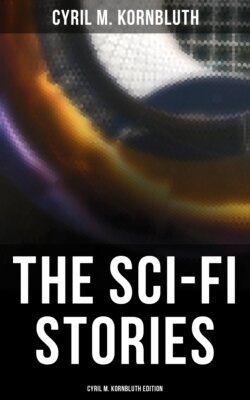Читать книгу The Sci-Fi Stories - Cyril M. Kornbluth Edition - Cyril M. Kornbluth - Страница 3
На сайте Литреса книга снята с продажи.
The Rocket of 1955
ОглавлениеTable of Contents
The scheme was all Fein's, but the trimmings that made it more than a pipe dream, and its actual operation, depended on me. How long the plan had been in incubation I do not know, but Fein, one day in the spring of 1954, broke it to me in a rather crude form. I pointed out some errors, corrected and amplified on the thing in general, and told him that I'd have no part of it—and changed my mind when he threatened to reveal certain indiscretions committed by me some years ago.
It was necessary that I spend some months in Europe, conducting research work incidental to the scheme. I returned with recorded statements, old newspapers, and photostatic copies of certain documents. There was a brief, quiet interview with that old, bushy-haired Viennese worshiped incontinently by the mob; he was convinced by the evidence I had compiled that it would be wise to assist us.
You all know what happened next—it was the professor's historic radio broadcast. Fein had drafted the thing; I had rewritten it and told the astronomer to assume a German accent while reading. Some of the phrases were beautiful: "American dominion over the very planets!—veil at last ripped aside—man defies gravity—travel through space—plant the glorious red, white and blue banner into the soil of Mars!"
The requested contributions poured in. Newspapers and magazines ostentatiously donated yard-long checks of a few thousand dollars; the Government gave a welcome half-million; heavy sugar came from the "Rocket Contribution Week" held in the nation's public schools; but independent contributions were the largest. We cleared seven million dollars, and then started to build the spaceship.
The virginium that took up most of the money was tin plate; the monatomic fluorine that gave us our terrific speed was hydrogen. The takeoff was a party for the news-reels: the big, gleaming bullet extravagant with vanes and projections; speeches by the professor; Farley, who was to fly it to Mars, grinning into the cameras. He climbed an outside ladder to the nose of the thing, then dropped into the steering compartment. I screwed down the soundproof door, smiling as he hammered to be let out. Rather to his surprise, there was no duplicate of the elaborate dummy controls he had been practicing on for the past few weeks.
I cautioned the pressmen to stand back under the shelter, and gave the professor the knife switch that would send the rocket on its way. He hesitated too long—Fein hissed into his ear, "Anna Pareloff of Cracow, Herr Professor...."
The triple blade clicked into the sockets. The vaned projectile roared a hundred yards into the air with a wabbling curve—then exploded.
A photographer, eager for an angle shot, was killed; so were some boys of the neighborhood. The steel roof protected the rest of us. Fein and I shook hands, while the pressmen screamed into the telephones which we had provided.
But the professor got drunk, and, disgusted with the part he had played in the affair, told all and poisoned himself. Fein and I left the cash behind and hopped a freight. We were picked off it by a vigilante committee (headed by a man who had lost fifty cents in our rocket). Fein was too frightened to talk or write, so they hanged him first, and gave me paper and pencil to tell the story as best I could.
Here they come, with an insultingly thick rope.
